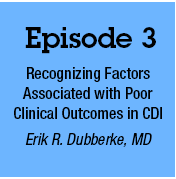| Educational Overview Costridium difficile infection (CDI) places a significant clinical and economic burden on the healthcare system. The increased morbidity and mortality associated with CDI is at least partially attributed to the spread of a hypervirulent strain known for its increased toxin production. Research findings have provided a better understanding of CDI pathogenesis, including the role of intestinal dysbiosis on short- and long-term patient outcomes. This has allowed clinicians to identify host factors that can be used to predict clinical outcomes, thereby guiding appropriate management strategies to resolve the infectious episode and minimize the risk for recurrent episodes. In the past, treatment has mainly been limited to vancomycin and metronidazole. Fortunately, new and emerging options can provide clinicians with an array of tools necessary to improve patient outcomes. These include potent narrow-spectrum antimicrobials that limit dysbiosis, as well as non-traditional therapeutic entities, such as fecal microbiota transplantation and monoclonal antibodies. The successful management of CDI involves efforts from all medical disciplines responsible for the care of at-risk patients. Infectious disease specialists can play a major role in ensuring that appropriate measures are in place to initiate appropriate and timely treatment to eradicate the infection and prevent recurrence. Target Audience This continuing medical education activity is planned to meet the need of healthcare providers in a variety of practice settings, including large and small health systems, outpatient clinics, managed-care organizations, long-term care facilities, and academia. This activity is especially beneficial for ID physicians and pharmacists who are on the frontline of managing patients with CDI in their institutions. Learning Objectives Upon completing this activity, participants will be able to:
|
Educational Format
These Online Presentations are based on the CME/CPE Satellite Symposium held during ICAAC/ICC 2015. Please Note: If you have received credit for attending the live symposium by the same name, you are not eligible to apply for credit for this online version. This online activity is divided into five portable and easy to access episodes:
Faculty
|
||||||||||||||||||||
| | ||||
Accreditation Center for Independent Healthcare Education designates this Enduring material for a maximum of 2.0 AMA PRA Category 1 Credit(s)™. Physicians should claim only the credit commensurate with the extent of their participation in the activity. International CME Physician Assistants Nurse Practitioners Pharmacists For questions regarding the accreditation of this activity, please contact us at info@jointsponsor.com
Method of Participation and Instruction for Credit
For questions regarding accreditation, please contact info@jointsponsor.com
Disclosure of Conflicts of Interest In accordance with policies set forth by the Accreditation Council for Continuing Medical Education (ACCME), Center for Independent Healthcare Education requires all faculty members and spouses/significant others with an opportunity to affect the content of a continuing education activity to disclose any relevant financial relationships during the past 12 months with commercial interests. A commercial interest is any entity producing, marketing, reselling or distributing health care goods or services consumed by or used on patients. Relationships with commercial interests and conflicts of interest resulting from those relationships must be revealed to the audience and resolved prior to the activityRelevant relationships include roles such as speaker, author, consultant, independent contractor (including research), employee, investor, advisory committee member, board member, review panelist, and investigator. If a potential speaker or author indicates a possible conflict of interest, the conflict will be resolved by choosing another speaker or author for that topical area, or the slides, handouts, and/or monograph will be reviewed and approved by a qualified commercially-disinterested peer. |
Disclosures Dr. Johnson discusses the off-label use of following: • Metronidazole (it was never FDA approved for CDI* but it is one of the most • Rifaximin (FDA-approved for treatment of non-inflammatory traveler’s diarrhea, • Fidaxomicin (FDA-approved for CDI) I will mention novel strategies for fidaxomicin • I will briefly mention other CDI treatment options that are available but not FDA- Thomas J. Louie, MD has relevant financial relationships with the following commercial interests: Dr. Louie does not discuss off-label uses of any products. Content review confirmed that the content was developed in a fair, balanced manner free from commercial bias. Disclosure of a relationship is not intended to suggest or condone commercial bias in any presentation, but it is made to provide participants with information that might be of potential importance to their evaluation of a presentation. Fee Hardware/Software Requirements Software/Hardware Connection Speed System Check Copyright Statement Privacy Policy http://www.vemcomeded.com/privacy.asp
Joint Providership Commercial Support This activity is supported by an educational grant from Merck & Co., Inc. |
|||
START ACTIVITY |








